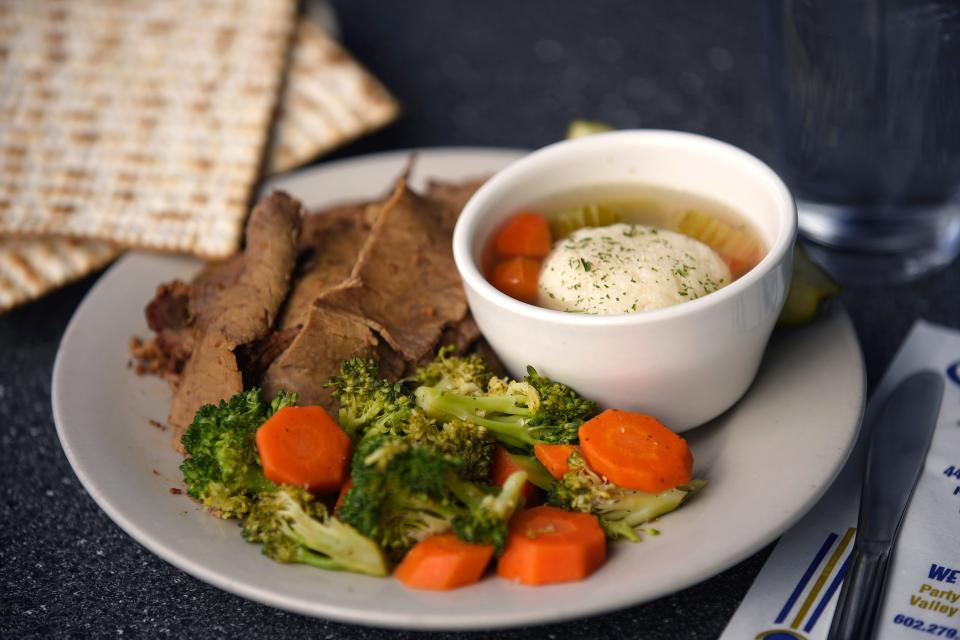His family taught him the beauty of Passover. Now he carries on tradition at their storied Phoenix deli
Corrections & Clarifications: In an earlier version of this article, afikomen was incorrectly described. It is a piece of matzo that parents hide for children to find during a Passover celebration. The restaurant's adherence to Jewish dietary rules also was incorrect. It is not kosher. In addition, photo captions incorrectly identified matzo crackers. The article also included an incorrect meaning of Passover.
Miracle Mile Deli was first opened in 1949 by New York native Jack Grodzinsky. Now, his daughter Jill and son-in-law George Garcia own and operate the deli with their son Josh, the vice president. As the third-generation operator and the only child of the Garcias, Josh manages day-to-day operations. He brought his Wimbledon marketing background to the family business when he started working there in 2005.
"It was an area I knew and felt comfortable in. I mean, I started serving coffee standing on a milk crate when I was 11 years old," he said.
The restaurant, which once mostly operated out of shopping centers, opened its first stand-alone location in 2015 on 16th Street. In 2016, the City of Phoenix proclaimed May 10 as Miracle Mile Deli Day in honor of the deli's long-standing success — at the time 67 years. To celebrate, Miracle Mile donated a portion of its proceeds to Feeding Matters, a nonprofit organization dedicated to children with feeding disorders. It's just one example of how the longtime business gives back to the community, which is important on Passover.
Josh has fond Passover memories, though since he took over the family business, his personal traditions have changed.
"In the deli business, I am the part of the community that's responsible for feeding people."
'Let's drink to Ukraine!': Odesa Jews celebrate a wartime Passover under curfew
When is Passover and how is it celebrated?
Passover changes every year because the Hebrew calendar is lunar-based. In 2024, Passover will begin in the evening of Monday, April 22, and will last through April 30 just after sundown.
For eight consecutive days, Jews participate in what's known as Pesach, or "Passover" in Hebrew, where a cumulative experience of religious history, education and festivities come together to commemorate the biblical account of Exodus in the Hebrew Bible.
"Nowadays, in our society with so much external noise, it's hard for people to focus on what's really meaningful in life," Garcia said. "So, Passover is a huge pause button for those who celebrate as a family."
The hallmark of the holiday is the Seder meal, which involves 15 steps of prayer and eating symbolic foods. It often lasts into the night and takes place during the first two nights of Passover. The dinner includes multiple components and readings of Haggadah in remembrance of the pain and suffering the Hebrews endured.

According to Martin Bodek, who writes modern versions of the Haggadah, "the Haggadah or 'telling' is the 3,000-year old collection of story, song and ritual that guides participants though the Seder."
The Seder plate, used as a display, typically includes: Haroset fruit, nuts and wine to represent the mortar the slaves used to build for Pharaoh; hard-boiled or roasted eggs to symbolize spring; a shankbone to represent the animal sacrifice the Israelites made before they left Egypt; a bitter herb in remembrance of the bitterness of slavery; karpas, a green spring vegetable that's dipped in salt water to represent the tears of the enslaved Israelites; and a second green vegetable, like lettuce, that's eaten with matzo and the bitter herb.
Jewish people abstain from eating leavened bread during Passover because the Israelites rushed out of Egypt with no time to make this type of bread. Hence, the matzo.
Dinner begins with the hardboiled egg dipped in saltwater and is usually followed by traditional foods like matzo ball soup, brisket, chicken or gefilte fish.
Jewish cuisine: Mina de Verduras or Passover Matzo Pie With Vegetables
A new Passover tradition at Miracle Mile Deli
Garcia remembers Passover fondly at his godparents' house. "My godmother was a phenomenal cook and took so much time to make the Seder dinner and so much pride in hosting it," he said. "I remember her taking hours to make her brisket and matzo ball soup and having the Seder plate; I remember searching for afikomen and reciting Hadaggah."
Afikomen is a piece of matzo that parents hide. When children find it, they win a prize.
To Garcia, Passover is a celebration of spiritual freedom. It's blocking out the external noise and accepting what the universe has in store for you.
Garcia is now living a different chapter in his life, one that he has embraced wholeheartedly, that puts his customers ahead and doesn't allow for him to celebrate as he did when he was a child.
"Right now, my role is about making the celebrations easy for others and taking the stress of a seven-hour brisket away, so people can enjoy their gatherings."
Visit Miracle Mile Deli for Passover
The deli is offering family meals and a la carte Passover staples for takeout and dine-in over the Passover holiday.
Sliced brisket family feast for four: two pounds of beef brisket, a quart of baby whole white potatoes, quart of steamed vegetables, four cups of matzo ball soup, 4 matzo crackers and butter for $95.
Brisket of beef by the pound for $32.
Quart of matzo ball soup for $14.
Additional matzo balls for $2 each.
Quart of vegetable soup for $14.
Quart of steamed vegetables for $14.
Quart of whole baby white potatoes for $14.
Details: 4433 N. 16th St., Phoenix. 602-776-0992, miraclemiledeli.com.
Hours: Monday to Saturday from 11 a.m. to 7 p.m., closed on Sunday.
Say hi to Sauvauge wine bar: Inside one of the most anticipated spots of 2023
Reach the reporter at BAnooshahr@azcentral.com. Follow @banooshahr on Twitter.
This article originally appeared on Arizona Republic: Passover dinner in Phoenix has a special meaning at Miracle Mile Deli


